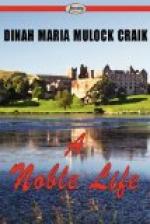“Poor boy! poor boy!”
“Then you don’t think him altogether a bad boy?” appealed Mrs. Bruce, pitifully. “You do not fear that I may live to weep over the day when my son was born?”
The earl smiled, and that quiet, half-amused smile, coming upon her in her excited state, seemed to soothe the mother more than any reasoning could have done.
“No, Helen, I do not think any such thing. I think the lad has been very foolish, and we may have been the same. We kept him in leading-strings too long, and trusted him out of them too suddenly. But as to his being altogether bad—Helen Cardross’s son, and the minister’s grandson—nonsense, my dear.”
Mr. Cardross might have heard himself named, for he stirred in his peaceful slumbers, and Helen hastily took her letter from Lord Cairnforth’s hand.”
“Not a word to him. He is too old. No trouble must ever come near him any more.”
“No, Helen. But remember your promise to do nothing till you have talked with me. It is my right, you know. The boy is my boy too. When will you come up to the Castle?” To-morrow? Nay, to-night, if you like.”
“I will come to-night.”
So, at dusk, in the midst of a wild storm, such as in these regions sometimes, nay, almost always succeeds very calm, mild autumn days, Helen appeared at the Castle, and went at once into the library where the earl usually sat. Strange contrast it was between the spacious apartment, with its lofty octagon walls laden with treasures of learning; book-shelves, tier upon tier, reaching to the very roof, which was painted in fresco; every ornamentation of the room being also made as perfect as its owner’s fine taste and lavish means could accomplish, and this owner, this master of it all, a diminutive figure, sitting all alone by the vacant fireside—before him a little table, a lamp, and a book. But he was not reading; he was sitting thinking, as he often did now; he said he had read so much in his time that he was rather weary of it, and preferred thinking. Of what? the life he had passed through—still, uneventful, and yet a full and not empty human life? Or it might be, oftener still, upon the life to come?
Lord Cairnforth refused to let his visitor say one word, or even sit down, till he had placed her in Mrs. Campbell’s charge, to be dried and reclothed, for she was dripping wet with rain—such rain as come nowhere but at Loch Beg. By-and-by she reappeared in the library, moving through its heavy shadows, and looking herself again—the calm, dignified woman, “my cousin, Mrs. Bruce,” who sometimes appeared among Lord Cairnforth’s guests, and whom, though she was too retiring to attract much notice, every body who did notice was sure to approve.
She took her accustomed place by the earl’s side, and plunged at once, in Helen’s own way, into the business which had brought her hither.
“I am not come to beg or to borrow, do not think it—only to ask advice. Tell me, what am I to say to my boy?”




